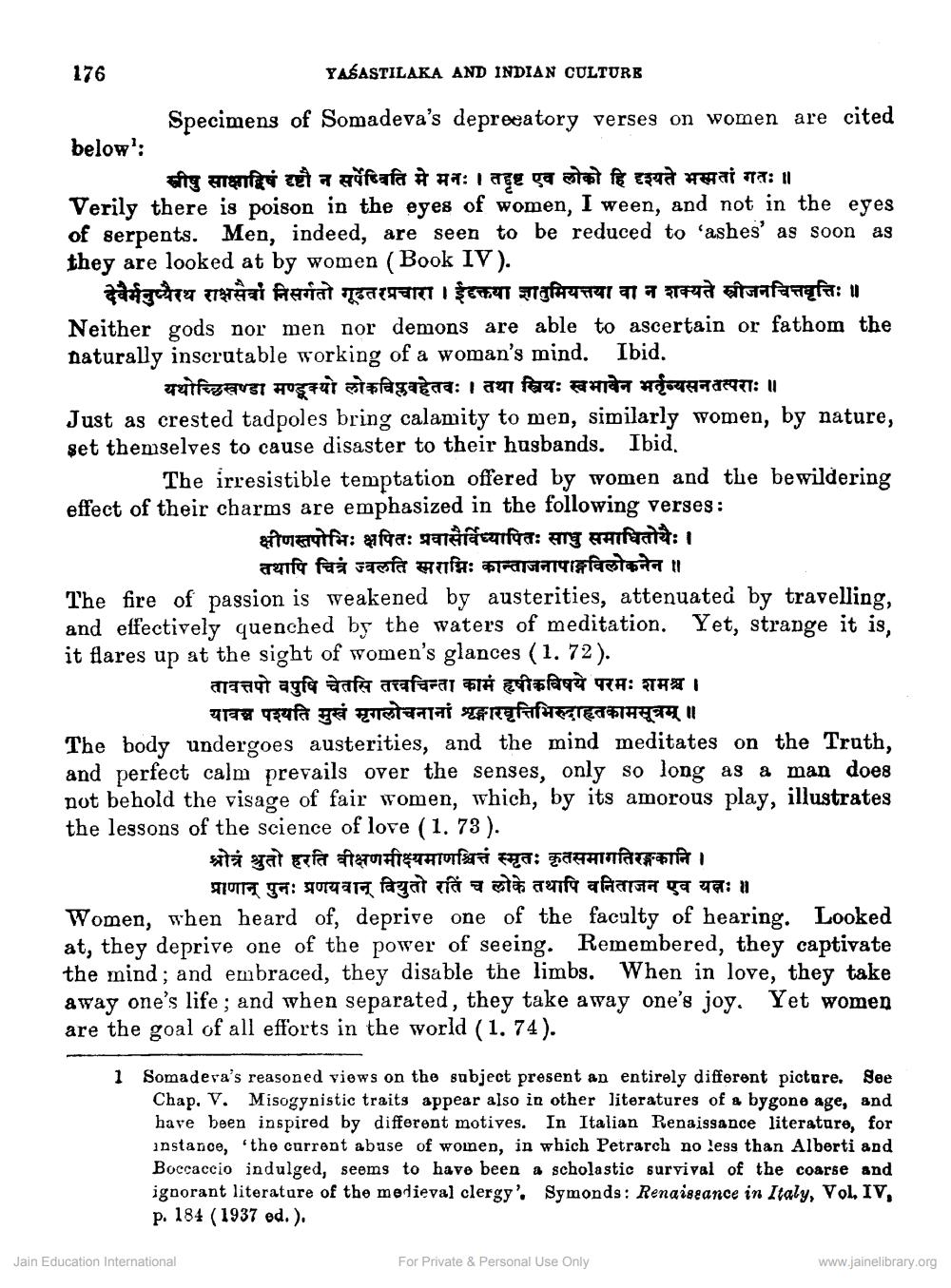________________
176
below':
YASASTILAKA AND INDIAN CULTURE
Specimens of Somadeva's deprecatory verses on women
स्त्रीषु साक्षाद्विषं दृष्टौ न सर्पेष्विति मे मनः । तद्दृष्ट एव लोको हि दृश्यते भस्मतां गतः ॥ Verily there is poison in the eyes of women, I ween, and not in the eyes of serpents. Men, indeed, are seen to be reduced to 'ashes' as soon as they are looked at by women (Book IV).
देवैर्मनुष्यैरथ राक्षसैवां निसर्गतो गूढतरप्रचारा । ईदृक्तया ज्ञातुमियत्तया वा न शक्यते स्त्रीजनचित्तवृत्तिः ॥ Neither gods nor men nor demons are able to ascertain or fathom the naturally inscrutable working of a woman's mind. Ibid.
यथोच्छिखण्डा मण्डूक्यो लोकविप्लवहेतवः । तथा स्त्रियः स्वभावेन भर्तृव्यसन तत्पराः ॥ Just as crested tadpoles bring calamity to men, similarly women, by nature, set themselves to cause disaster to their husbands. Ibid,
The irresistible temptation offered by women and the bewildering effect of their charms are emphasized in the following verses: क्षीणस्तपोभिः क्षपितः प्रवासैर्विध्यापितः साधु समाधितोयैः । तथापि चित्रं ज्वलति स्मराग्निः कान्ताजनापाङ्गविलोकनेन ॥
are cited
The fire of passion is weakened by austerities, attenuated by travelling, and effectively quenched by the waters of meditation. Yet, strange it is, it flares up at the sight of women's glances (1. 72).
तावत्तपो वपुषि चेतसि तत्वचिन्ता कामं हृषीकविषये परमः शमश्च । याच पश्यति मुखं मृगलोचनानां शृङ्गारवृत्तिभिरुदाहृतकामसूत्रम् ॥
The body undergoes austerities, and the mind meditates on the Truth, and perfect calm prevails over the senses, only so long as a man does not behold the visage of fair women, which, by its amorous play, illustrates the lessons of the science of love (1. 73).
श्रोत्रं श्रुतो हरति वीक्षणमीक्ष्यमाणश्चित्तं स्मृतः कृतसमागतिरङ्गकानि । प्राणान् पुनः प्रणयवान् वियुतो रतिं च लोके तथापि वनिताजन एव यत्रः ॥
Jain Education International
faculty of hearing. Looked Remembered, they captivate
Women, when heard of, deprive one of the at, they deprive one of the power of seeing. the mind; and embraced, they disable the limbs. When in love, they take away one's life; and when separated, they take away one's joy. Yet women are the goal of all efforts in the world (1.74).
1 Somadeva's reasoned views on the subject present an entirely different picture. See Chap. V. Misogynistic traits appear also in other literatures of a bygone age, and have been inspired by different motives. In Italian Renaissance literature, for instance, the current abuse of women, in which Petrarch no less than Alberti and Boccaccio indulged, seems to have been a scholastic survival of the coarse and ignorant literature of the medieval clergy'. Symonds: Renaissance in Italy, Vol. IV, p. 184 (1937 ed.).
For Private & Personal Use Only
www.jainelibrary.org




